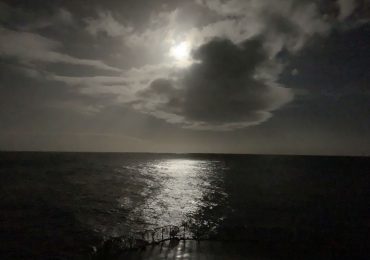New original fiction in The JRB.
~~~
The Deep River of Missing Things
By Tshegofatso Nkwane
I wasn’t there to see the spark, but I know the fire started with the deep fryer and stretched out to kiss the bottom embroidery of my mother’s lace curtain. It extended its neck to swallow the rest of the material, destroying the hem and vintage design so that no evidence of the fabric’s artistry remained. And then the fire’s tongue tore at the first layer of the cream white paint of the ceiling, creating black soot above, like the work of a deeply disturbed painter.
The fire brushed its bristles across the kitchen, stroking the angry flames, engulfing everything: the tiny sunflowers Mama spent weeks painting on the wallpaper; the still-wet cutlery on the sink that I had rinsed after our supper of lentil soup and toast; the breadbin and, inside, the single slice of white Albany bread that had remained uneaten for days.
The fire proceeded to devour all the ingredients that had sustained our lives: raw samp and beans, loaves of white milkbread, a sack of potatoes, jars of atcha, cheese, sausages and sauces. It took everything while we slept, and I wish I had stayed asleep a little longer, but Ma Tsotetsi and her alcoholics surrounded our house, throwing stones at our windows to wake us.
I roused like a resuscitated corpse and when my nose caught the scent of the sizzling things I shook my mother out of sleep. It took her a few seconds to smell the smoke. The air in my mother’s house was veneered by an aggressive smog that blinded both of us so that we needed our arms to navigate our own space. I had a heightened sense of sound. There was the soft roar of a burning kitchen and of a living room that seemed eager to participate. I heard things breaking, burning, voices booming outside, my own heart beating inside my chest and my mother’s coughing. Then her silence came, as if the fire had stopped suddenly and the smoke had halted its hogging of our lungs. She stood in the passage, and she watched the destruction of her childhood home. I witnessed her paralysis, as she glued her eyes to the flames.
There was a square opening in our ceiling where Mama kept her recipes, in a corroded metal toolbox that was older than I was.
I tried to jog her out of her immobility. The only way out was through the back door. But its key was kept in a drawer in the living room. I thought, briefly, that this was the end. We were going to die, and I was the only one between us who could see it coming.
But then a banging on the back door began, and the blade of an axe cutting through its wooden planks greeted us. Tinashe peered through the space she had chopped open and we exchanged a deep look of horror. I hauled my mother towards the door, but while I managed to move her body, her eyes stayed stitched to the kitchen ceiling. Once Tinashe broke the door, she beckoned me to pull my mother out of the house. As soon as I helped my mother escape the fire, I collapsed on the gravel and coughed so intensely that the sand and small stones dispersed under my breath.
My mother looked at her house through the battered back door and watched as the fire grew greedier, swallowing big bodies of furniture like a hungry python. Ma Tsotetsi and her tavern drunks poured buckets of water through the doors and the cracked windows. Before I knew it, every resident of Sakhumzi Street was in our yard. Everyone had a bucket and they scattered to find the nearest taps. Even Mme Lovie from House 2768 came to our aid, with her weak knees and the night sleep still stuck in her eyes.
My mother was still a mannequin.
One of Mme Lovie’s three sons, Thebe, called the firefighters, and in just under thirty minutes they arrived, ordering everyone away from the house. My mother didn’t move an inch. One of the firefighters grabbed her by her waist, picked her up, and carried her to the street. She remained frozen. They filled our home with foam, and everyone looked on. Their concern eased, because nobody had died, and it felt as if our misfortune suddenly became a source of entertainment. The street was beginning to fill with chattering, speculation, and material for Tuesday afternoon tea. I stood close to my mother, and witnessed the melting of her face. The shock slowly softened and she looked as if she was blinking and breathing again. She searched my body frantically, looking for cuts and burns. I didn’t realise that I had singed my right palm when I touched the kitchen door frame. Mama blew on my hand. A blister had begun to grow. She slid her index finger gently over it. And then she collapsed on the tar and crossed her legs. She buried her face in her hands. Eager eyes turned to her. Ma Tsotetsi removed her brown doek and placed it on the street to kneel on. She put her hands on my mother’s head and prayed for her. Tinashe pulled me away and enveloped me in her arms. I didn’t realise that I had started crying.
As soon as the firefighters had done their job, they regrouped and conferred. I knew they were deliberating about how the fire might have started. They tried to talk to my mother, but she didn’t seem to notice that there were people around her. One of them approached me with my skateboard in his hand. Tinashe took it from him and put it on the ground. She brushed her open hand on my back to comfort me, and then I looked up from her shoulder and saw Tumelo. He was walking past my house with an emptiness in his eyes. He was dragging a big Pikitup plastic bag containing his possessions. Ma Tsotetsi turned to look at him and her face fell to the floor, but she was praying for someone else, and he had hurt her so much, she had started to train herself not to care.
Tumelo walked past his home like a ghost that didn’t know where it had lived when it was human. I wanted to stop him. I wanted him to hug me. I wanted to bury my face in his chest, but I knew his heart beats differently and it would scare me. There was enough heartbreak for me that night.
*
Mama rented out two shacks behind our house. Tinashe stayed in one of them. A few days before the fire, she had negotiated to take the other to use as a hair salon. Tinashe was a talented hairstylist, eager to earn her own money in a foreign country, albeit in a familiar community. The fire, however, took her salon away from her, as Mama and I had no choice but to move into the shack. I hated it there. There were cobwebs, tiny, spiteful spiders, dust in every nook and a door that was uneven at the bottom, so that we had to use old rags to close the gap. The people of Sakhumzi Street donated many things to keep us going: clothes, cups, teabags, bread, sugar, water bottles, bathing buckets. Mme Lovie gave us an old red mattress with the words ‘Lala Phansi’ at its corner. In the weeks that followed the fire, the Lala Phansi became Mama’s burial ground. Depression had its hands on her throat, and I did not know what to do with all the dying she was doing.
*
My morning ritual after the fire never varied. I would wake up just before the sun rose, with a morose spirit, like a lonely rose growing in the crevice of a crumbling tar road. That’s what my mother’s sadness did. It left me all alone. I would open my eyes, long after I’d woken up, and crane my neck to look at her, and then fall back on my pillow after confirming that she had not been asleep; she simply did not want to talk to me. She was always wide awake, her head placed gingerly on her folded arm, watching the rotten door as if gathering the strength to open it and let the air in. I tried to free her tongue, but every time I spoke to her I was painfully aware of what I had done.
One morning, I thought I’d try once more. I anticipated she would not respond, but talking to her was the only way I could think of to exhume her. The problem was that her silence often dragged me down there with her.
‘Mama, Mama ke eng? Ong kwatetsi? Askies, askies neh?’ I began. ‘You told me, every day you told me, “Don’t forget Mole, switch it off. I saw on the news, a Coloured lady in Riverlea had her whole house burn down because of loadshedding. Don’t forget.” I forgot Ma. And I’m sorry. Please say something. Anything. Be loud, swear at me, tell me to go back to my father, tell me you hate me, tell me you don’t want me anymore, tell me just tell me … I just want to be told. I just want you to talk to me.’
It was raining, and the drops were doing a gumboot dance on our metal roof. It was so loud I had to bring my mouth closer to my mother’s ear. I turned on my side, placed my hand on her arm, and whispered to her.
‘Do you still love me? Yes, or no? Do you want me to leave you alone? Yes, or no? Do you want me to go? Yes, or no? Mama, I don’t want to stay here with a ghost. You don’t know what this silence is doing to me, Mama. Tell me, Yes or no. Mole stay, or Mole go.’
My hand rose and fell as she breathed in and out, in and out. When she answered me, she held her breath and my hand stayed at the very top of it.
‘Go.’
‘Mama?’
‘Mole go. Mole go.’
Her face was damp from crying and she seemed unbothered by the wet discharge in her nose. My mother had become unbothered by a lot of things—her unbathed skin, the clothes on her back that still reeked of fire, and her sore bones. She had stayed in one position for so long, I had begun to worry about her left hip.
I wanted to wipe away her tears, but what did she mean I should go? Go where? For how long? Should I leave her alone for the morning, or did she mean forever? Did I?
I wished I hadn’t untied her tongue. I lifted my hand from her arm and rose from the mattress. I stepped slowly to the door, and clutched at the handle. I turned to face her, but she was staring through me.
‘Mama, do you want me to come back?’
She picked up her eyes and gazed at me. I sighed gratefully, I could see that she just wanted space. But I wished she hadn’t looked at me. She was drowning, my mother, in a deep river of missing things. She closed her eyes and turned around, relieving her left hip. I opened the door and closed it behind me. I pressed my back on it, letting the rain wash me away.
I went into the house. The fire had turned my mother’s home into a carcass. I stood in the middle of its devoured belly and bones. I made my way to what had been its heart and I sat there, with my legs crossed. I looked up and stared at the sky.
Suddenly Mama’s paralysis made more sense.
Puleng’s Pot had belonged to my grandmother. It was originally called Lady Puleng’s Pot, as my grandmother had insisted that everyone call her Lady Puleng, but Mama thought that was too long. It was a fitting name for my grandmother, however. In all my memories of her, she is wearing midi flare dresses under patterned aprons. She had long grey hair that she relaxed at least once a month. It was always in a small bun, with pins tucking in the pieces that had attempted escape. Nothing had ever been amiss on my grandmother’s face, or in her home. My mother was the same. She noticed the smallest crumb on the floor. ‘Cleanliness is close to godliness,’ she always said. ‘Mole, when you clean, you appease your spirit. Your spirit knows when you look good, because you will feel good, and the girls inside of us want to feel good all the time.’
Lady Koko Puleng sold hearty home-cooked meals that brought people from all over Soweto to our house. People from Zola, Tladi, Moletsane and even Diepkloof travelled to eat her oxtail, samp, tripe and pap, rice and chicken stew. They would cross the street and buy beers at Ma Tsotetsi’s tavern, but they always crossed back, with their tongues still licking their fingers, and they would thank her, and some would ask her for her recipes. She refused, of course, but the validation of her talents always made her blush like a young girl.
Koko’s recipes were written by hand on little pages that were folded to fit into a metal box. She kept them in the ceiling. I remember, because there was always a ladder in the middle of the kitchen when she was preparing to cook. One morning, during her final year on earth, she asked me to read out her chicken stew recipe so that we could cook Mama her birthday supper.
Ingredients:
- 1 teaspoon sunflower oil
- 6 pieces of chicken
- 1½ onions
- Garlic
- 1 whole green pepper
- 4 carrots
- 6 big potatoes
- 1 beef stock cube
- Tomatoes (Put them in boiling water and then peel the skin)
- Worcestershire sauce
- Salt and pepper (Don’t be stingy with the salt, I know you.)
You are a good cook, maybe one day you’ll be better than me, but don’t change this recipe Dini hle. This was your father’s favourite meal. Mine too, and for reasons beyond its taste. When you were a child, you once stole a piece of chicken from your father’s plate. Remember? Remember how he chased you around the house because you had stolen his last piece? You will always be my little girl, old as you are reading this.
Also, I know you love my chicken stew, but don’t forget to be a lady. No finger licking. That’s what tissues are for.
They were love letters. And the fire had stolen them. Koko Puleng could not rewrite them from her grave. I wept as I remembered helping my grandmother cook that day. She would point at the ingredients and I noticed the tremor in her hands, the arthritis in her bones slowing her movement. At seventy-eight, she did not often cook anymore, but she had wanted to give my mother chicken stew for her birthday. Mama had been forty-two, but she would always be her little drumstick thief. I buried my head in my hands. Mama was an adult when Koko died. I always thought she had swallowed the misfortune with ease, being old enough to know that elders die. I only saw Mama cry once, at her mother’s funeral. But no I could imagine, when I was sleeping, or at school, or playing with my friends, her climbing the ladder and reading her letters. Maybe she brought her mother back by doing so. Maybe the letters helped her miss her a little less. Maybe they reminded her that she was once somebody’s daughter.
My hands were covered with tears. I had taken my mother’s mother away. I started to wonder if Mama would ever get up from the Lala Phansi and forgive me, if she would one day open the shack door, walk on her bare feet, feel the sun again and find me in our kitchen, waiting.
~~~
- Tshegofatso Nkwane is a storyteller from Soweto, and a former resident writer of the Jakes Gerwel Foundation. With a background in English literature and global social impact work, she focuses on social justice narratives, particularly those located in townships. She would like to acknowledge the Jakes Gerwel Foundation and its partners Litnet and Huisegenoot for the work completed during her residency, including this story.
~~~






Nice storyline
How does one get hold of the book? nice read.